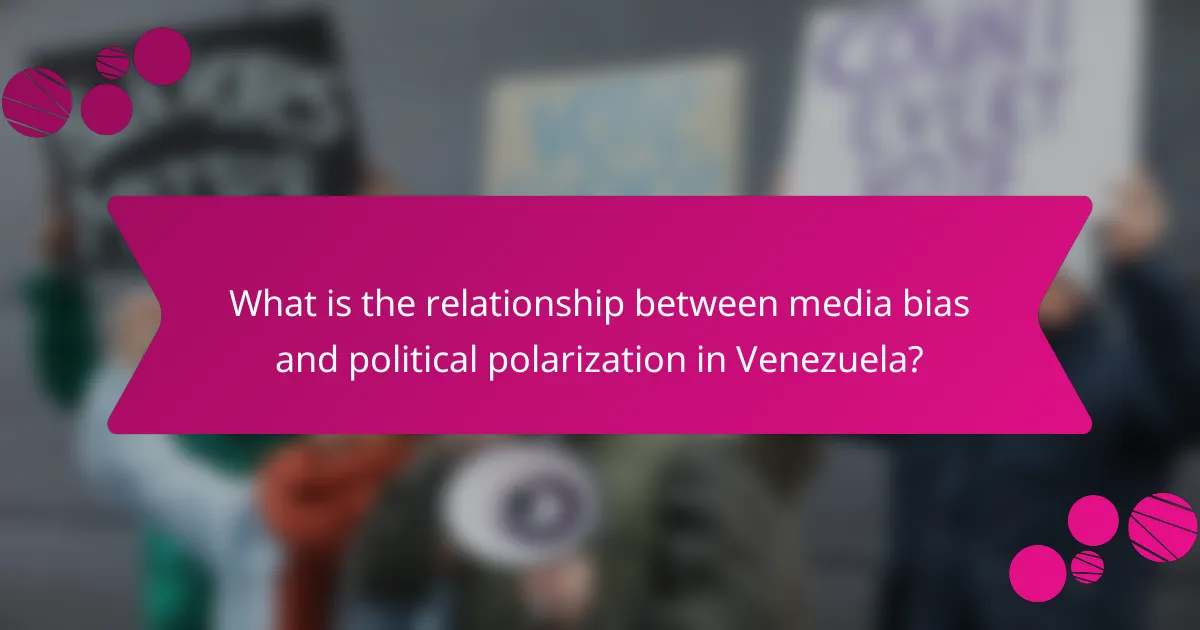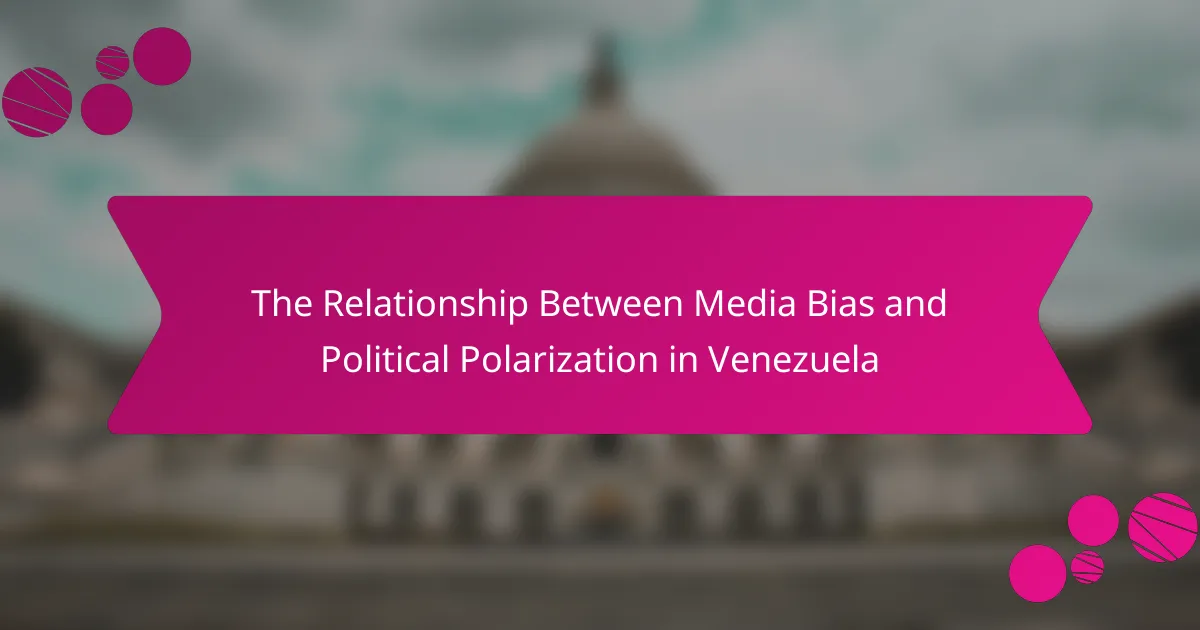
What is the relationship between media bias and political polarization in Venezuela?
Media bias significantly contributes to political polarization in Venezuela. Biased media outlets often promote specific political agendas. This selective reporting influences public perception and opinion. For example, pro-government media portrays opposition negatively. Conversely, opposition media highlights government failures. This creates an echo chamber effect among audiences. Research indicates that exposure to biased media increases partisan divides. The polarized media landscape exacerbates societal tensions and conflicts.
How does media bias manifest in Venezuelan media?
Media bias in Venezuelan media manifests through selective reporting and framing of news. State-controlled outlets often present a pro-government narrative. They emphasize positive developments while downplaying negative events. In contrast, opposition media highlight government failures and human rights abuses. This creates a polarized media landscape. According to a 2021 report by Human Rights Watch, government censorship restricts independent journalism. Journalists face intimidation and violence, further skewing media representation. Such conditions exacerbate political polarization among the populace.
What are the different types of media bias observed in Venezuela?
Venezuela exhibits several types of media bias. These include partisan bias, where outlets favor specific political parties. There is also selection bias, evident in the omission of critical news. Sensationalism is present, emphasizing dramatic events over factual reporting. Additionally, there is framing bias, influencing public perception through specific narratives. These biases contribute to political polarization in the country. Studies show that media coverage often reflects the government’s agenda, affecting public opinion. For instance, during the 2019 protests, state media downplayed opposition activities while private outlets highlighted them. This selective representation reinforces divisions among the populace.
How does ownership influence media bias in Venezuela?
Ownership significantly influences media bias in Venezuela. Media outlets are often owned by individuals or groups with political affiliations. This ownership structure leads to biased reporting that favors specific political agendas. For example, major television networks like Televen and Globovisión have been criticized for their alignment with opposition parties. Conversely, state-owned media such as VTV promote government narratives. Studies indicate that media ownership correlates with the portrayal of political events. Research shows that biased media coverage can exacerbate political polarization among the public. Thus, ownership shapes the media landscape, impacting public perception and political discourse in Venezuela.
Why is political polarization significant in the context of Venezuela?
Political polarization is significant in the context of Venezuela because it exacerbates social divisions and hinders democratic processes. The country has experienced deep ideological splits, primarily between supporters of the government and opposition groups. This polarization fuels conflict and violence, impacting daily life for Venezuelans. It also complicates efforts for political dialogue and reconciliation. Media bias plays a critical role in this polarization by shaping public perceptions and reinforcing partisan narratives. Reports indicate that biased media coverage can deepen mistrust among citizens. This creates an environment where constructive debate is nearly impossible, further entrenching divisions. Ultimately, political polarization in Venezuela undermines stability and hinders potential pathways to resolution.
What factors contribute to political polarization in Venezuela?
Political polarization in Venezuela is influenced by several key factors. One major factor is the role of state-controlled media. The government uses media to promote its agenda and discredit opposition. This creates a divided public perception. Economic instability further exacerbates polarization. High inflation and shortages lead to frustration among citizens. Additionally, political parties are deeply divided along ideological lines. The opposition and government factions often refuse to engage in dialogue. Social media also plays a significant role. It amplifies extreme viewpoints and fosters echo chambers. Historical conflicts, such as the 2002 coup attempt, have left lasting divides. These factors collectively contribute to the heightened political polarization observed in Venezuela.
How does political polarization affect social cohesion in Venezuela?
Political polarization significantly undermines social cohesion in Venezuela. It fosters division among citizens, leading to increased hostility and mistrust. The country has experienced deep ideological splits between supporters of the government and the opposition. These divisions manifest in violent confrontations and social unrest. According to a 2020 study by the Latin American Public Opinion Project, polarization has escalated social fragmentation. Additionally, surveys indicate that individuals increasingly isolate themselves within like-minded communities. This isolation hampers dialogue and collaborative efforts to address national issues. As a result, Venezuela’s social fabric continues to weaken.
What role does media play in shaping political opinions in Venezuela?
Media plays a crucial role in shaping political opinions in Venezuela. It influences public perception and political discourse. The Venezuelan media landscape is characterized by significant polarization. State-controlled media promotes government narratives. This creates a biased information environment. In contrast, independent media outlets often face censorship and intimidation. They provide alternative viewpoints that challenge official narratives. Research indicates that media consumption patterns directly affect political attitudes. For instance, studies show that individuals exposed to opposition media are more likely to adopt dissenting views. Therefore, the media’s role in Venezuela is pivotal in reinforcing or challenging political ideologies.
How do media narratives influence public perception of political parties?
Media narratives shape public perception of political parties by framing issues and influencing discourse. These narratives can highlight specific attributes of parties, such as their policies or scandals. For example, biased reporting can amplify negative aspects of one party while downplaying another’s flaws. Research shows that consistent media portrayal can create lasting impressions on voters. In Venezuela, media narratives have contributed to political polarization by promoting distinct ideologies. This polarization affects how citizens align with parties based on the narratives they consume. Studies indicate that media bias correlates with increased division among the electorate. Thus, media narratives play a critical role in shaping public perception and political alignment.
What impact does social media have on political polarization in Venezuela?
Social media significantly contributes to political polarization in Venezuela. It amplifies partisan viewpoints and creates echo chambers. Users often engage with content that aligns with their beliefs. This selective exposure reinforces existing biases. Studies show that social media platforms like Twitter and Facebook are used for political mobilization. They facilitate the spread of misinformation, further dividing public opinion. A report by the International Crisis Group highlights how social media exacerbates tensions between opposing political factions. The result is a more fragmented political landscape, complicating dialogue and consensus-building.
How do media bias and political polarization interact in Venezuela?
Media bias and political polarization in Venezuela significantly influence each other. Media outlets often align with specific political ideologies. This alignment amplifies existing divisions among the populace. For instance, pro-government media promotes the ruling party’s narratives. Conversely, opposition media highlights government failures and promotes dissent. This creates echo chambers, reinforcing polarized views. Research indicates that biased reporting increases public distrust in opposing viewpoints. A study by the International Foundation for Electoral Systems found that Venezuelans increasingly rely on partisan sources for news. This reliance deepens societal divides and hampers constructive dialogue.
What are the consequences of media bias on political polarization levels?
Media bias significantly increases political polarization levels. Biased reporting often reinforces existing beliefs among audiences. This leads to a deeper divide between opposing political factions. Studies show that individuals exposed to biased media develop stronger partisan identities. Such polarization can result in decreased willingness to engage with opposing viewpoints. In Venezuela, media bias has contributed to heightened tensions during political crises. The polarization can hinder effective dialogue and compromise. Consequently, this environment fosters an atmosphere of conflict rather than collaboration.
How does political polarization affect media consumption patterns in Venezuela?
Political polarization significantly influences media consumption patterns in Venezuela. Individuals tend to seek out media that aligns with their political beliefs. This behavior creates echo chambers, where opposing views are often dismissed. Research indicates that pro-government and opposition media outlets cater to their respective audiences. For instance, studies show that government supporters primarily consume state-controlled media. In contrast, opposition supporters gravitate towards independent news sources. This bifurcation leads to a fragmented media landscape. Consequently, misinformation can thrive in polarized environments. The overall impact is a reduced capacity for public discourse and consensus-building.
What strategies can be employed to mitigate media bias and polarization in Venezuela?
Promoting media literacy is a key strategy to mitigate media bias and polarization in Venezuela. Educating the public on identifying bias helps them critically evaluate news sources. Encouraging diverse media consumption can also reduce polarization. Exposure to a variety of perspectives fosters understanding and tolerance. Supporting independent journalism is crucial. Independent outlets can provide balanced reporting that counters biased narratives. Regulatory frameworks can be established to ensure transparency in media ownership. Transparency helps the audience understand potential biases. Collaboration among media organizations can lead to shared standards for ethical reporting. Joint initiatives can enhance credibility and trust in the media. Community engagement initiatives can be implemented to encourage dialogue among polarized groups. Dialogue promotes empathy and reduces conflict.
How can media literacy programs help address these issues?
Media literacy programs can help address issues of media bias and political polarization in Venezuela by equipping individuals with critical thinking skills. These programs educate participants on how to analyze and evaluate media sources. They teach how to identify bias, misinformation, and propaganda in news coverage. Research indicates that media literacy enhances individuals’ ability to discern credible information. A study by the Stanford History Education Group found that students who received media literacy instruction improved their ability to evaluate online information. By fostering informed media consumption, these programs can reduce the impact of biased narratives on public opinion and promote constructive dialogue.
What role can independent journalism play in reducing polarization?
Independent journalism can play a crucial role in reducing polarization by providing unbiased information. It offers diverse perspectives that challenge echo chambers. This helps individuals understand opposing viewpoints. Independent journalists prioritize fact-checking and accountability. They aim to present news without political bias. Studies show that exposure to balanced reporting can decrease partisan attitudes. For example, research indicates that readers of independent news sources exhibit more open-mindedness. This fosters dialogue and reduces hostility between differing political groups.
The main entity of this article is the relationship between media bias and political polarization in Venezuela. The article explores how media bias contributes to political polarization by promoting specific political agendas through selective reporting and framing. It examines various types of media bias, the influence of media ownership, and the significant role of media in shaping public perception and political opinions. Additionally, the article discusses the impact of political polarization on social cohesion and outlines strategies to mitigate media bias and polarization, including promoting media literacy and supporting independent journalism.
